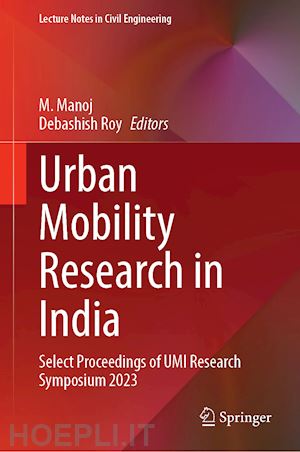
Questo prodotto usufruisce delle SPEDIZIONI GRATIS
selezionando l'opzione Corriere Veloce in fase di ordine.
Pagabile anche con Carta della cultura giovani e del merito, 18App Bonus Cultura e Carta del Docente
This book presents select proceedings of the research symposium held as part of the 16th Urban Mobility India Conference and Expo 2023 (UMI 2023). The book examines the broad perspectives of integrated and resilient transport applicable to urban transportation. It essentially provides an update of the ongoing research in urban transport-related themes such as transport resilience, sustainable transport, public transport and vulnerable road users, land use and urban transport, freight, and emerging mobility options. The book is a valuable reference for students, researchers, and professionals who study the broad areas of urban transport in India. It is also helpful to urban and transport planners and managers, traffic analysts, consultants, transportation advisors, and experts in planning, developing, operating, managing, and executing the transportation projects.
Chapter 1: Covid-19's Impact on Transportation Space and Abandoned Urban Design Practices.- Chapter 1: Smart Mobility and Cities 2.0: Advancing Urban Transportation Planning through Artificial Intelligence and Machine Learning.- Chapter 1: Impact of Geometric Characteristics on Capacity of Hill Road.- Chapter 1: Viability of water transport for passenger movement in Kochi.- Chapter 1: A study on pedestrian behaviour in different road traffic facilities in Indian traffic scenario.- Chapter 1: The Resilience of Transportation Infrastructure in India: Are We There Yet?.- Chapter 1: Reimagining Urban Mobility: Analyzing the Relationship between Mode Choice and Trip Chaining Behavior in Kota City, Rajasthan India.- Chapter 1: Empowering Mobility: Investigating the Mode Choice of Women Commuters in Developing Countries Using Multinomial Logit Modelling – A Case Study of Srinagar, India.- Chapter 1: Understanding the utilization pattern of pedestrian crossing facilities: evidence from Bhopal City. etc.
Dr. M. Manoj is currently an associate professor of transportation engineering at the Department of Civil Engineering, Indian Institute of Technology (IIT) Delhi. He obtained his Ph.D. from the Indian Institute of Science (IISc), Bangalore, and M.Tech. from the Indian Institute of Technology (IIT) Guwahati. He researches on disaggregate travel demand analysis and modeling with applications to emerging mobility options, such as electric vehicles and connected and automated vehicles. He has more than 70 research articles published in reputable international journals and conference proceedings. Dr. Manoj has been serving as a member of several national and international technical societies and organizations. He is an editorial board member of Sustainable Transport and Livability (Taylor and Francis) and an editorial review board member of Oeconomia Copernicana.
Mr. Debashish Roy works at Larsen and Toubro Limited (L&T), Mumbai, India, and was an Urban Transport planner at the Institute of Urban Transport (India). He is Master of Engineering in Civil Engineering with a specialization in Highway and Traffic Engineering from the Indian Institute of Engineering Science and Technology (IIEST), Shibpur. He has 10 years of experience in the field of transportation and infrastructure planning in government, private, and non-profit organizations. He has worked on various projects funded by multilateral agencies like the ADB. He is the project coordinator for several projects related to MRTS, BRTS, at the Institute of Urban Transport (India). He has been involved in the annual flagship event on Urban Mobility India (UMI) Conference cum Expo.











Il sito utilizza cookie ed altri strumenti di tracciamento che raccolgono informazioni dal dispositivo dell’utente. Oltre ai cookie tecnici ed analitici aggregati, strettamente necessari per il funzionamento di questo sito web, previo consenso dell’utente possono essere installati cookie di profilazione e marketing e cookie dei social media. Cliccando su “Accetto tutti i cookie” saranno attivate tutte le categorie di cookie. Per accettare solo deterninate categorie di cookie, cliccare invece su “Impostazioni cookie”. Chiudendo il banner o continuando a navigare saranno installati solo cookie tecnici. Per maggiori dettagli, consultare la Cookie Policy.